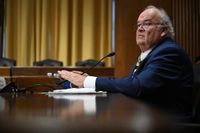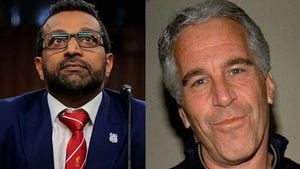In a move that has sent shockwaves through Washington, President Donald Trump abruptly removed Internal Revenue Service Commissioner Billy Long from his post on August 8, 2025, just weeks after Long was sworn in. The ouster, confirmed by multiple sources and reported by both NBC News and the Associated Press, marks the latest chapter in a year of remarkable instability for the nation’s top tax agency.
Billy Long, a former Republican congressman from Missouri and a one-time auctioneer, had only been sworn in as IRS commissioner in June 2025. His tenure, lasting less than two months, is the shortest for a Senate-confirmed IRS chief since the position was created in 1862, according to the Associated Press. Long’s rapid exit adds to the turbulence at the IRS, which has now seen six different leaders under Trump this year alone.
Long’s removal came without public explanation from the White House. The reasons for his dismissal remain unclear, and the administration has so far declined to comment. However, the shake-up occurs as the IRS faces sweeping job cuts and mounting operational challenges. These cuts are part of a broader push led by Elon Musk’s Department of Government Efficiency (DOGE), which has targeted federal payrolls across several agencies in a bid to reduce waste, fraud, and abuse.
Replacing Long, at least for now, is Treasury Secretary Scott Bessent. Bessent, who already manages the Treasury Department and oversees delicate trade negotiations with China, Canada, Mexico, and other nations, will serve as acting IRS commissioner. He’s also involved in the ongoing search for the next Federal Reserve chair. The IRS, which operates under the Treasury’s umbrella, now falls squarely under Bessent’s direct oversight—a responsibility that only adds to his already full plate.
The sudden firing came a day after Long sent an internal email to IRS staff, joking about leaving work early ahead of his 70th birthday. According to The New York Times, Long wrote, “Please enjoy a 70-minute early exit tomorrow. That way you’ll be rested for my 70th birthday on Monday.” The lighthearted note now stands in stark contrast to the abrupt end of his tenure.
Adding another twist, Long took to social media on August 8 to announce that President Trump had nominated him for an ambassadorship. “It is a honor to serve my friend President Trump and I am excited to take on my new role as the ambassador to Iceland. I am thrilled to answer his call to service and deeply committed to advancing his bold agenda. Exciting times ahead!” Long wrote on X (formerly Twitter). The White House has not confirmed the nomination or provided further details.
Long’s brief time at the helm was marked by ambitious—if unrealized—plans to reshape the agency’s internal culture. In a message to IRS employees after his confirmation, Long said, “In my first 90 days I plan to ask you, my employee partners, to help me develop a new culture here. I’m big on culture, and I’m anxious to develop one that makes your lives and the taxpayers’ lives better.” Unfortunately, Long never reached this milestone.
His appointment was controversial from the start. While in Congress from 2011 to 2023, Long had sponsored legislation to eliminate the IRS altogether. He had no background in tax administration, and after leaving Congress, he worked with a firm that distributed the pandemic-era employee retention tax credit—a program later shut down for fraud under then-IRS Commissioner Daniel Werfel. Democrats in the Senate voiced concerns about Long’s ties to the firm and about campaign contributions he received following his nomination. They called for a criminal investigation into Long’s connections to other alleged tax credit loopholes, alleging that firms linked to him had duped investors into purchasing fake tax credits.
Despite these concerns, Long was confirmed by the Senate on a 53-44 vote. He succeeded Danny Werfel, President Joe Biden’s nominee, who held the IRS commissioner role until Trump’s inauguration in January 2025. Before Long’s confirmation, the IRS cycled through four acting leaders, some of whom left under clouds of controversy. One resigned over a data-sharing deal between the IRS and the Department of Homeland Security, while another’s appointment sparked a dispute between Elon Musk and Scott Bessent.
The agency’s internal turmoil has been exacerbated by a drastic reduction in workforce. According to the Treasury Inspector General for Tax Administration, the IRS has shrunk from 103,000 workers in January to just 77,000 by May 2025. Most of these reductions came through DOGE’s deferred resignation program, part of the Trump administration’s broader effort to shrink the size of the federal bureaucracy. The impact of these cuts has been significant, leaving the IRS grappling with staff shortages, increased pressure from Congress and the public, and a growing backlog of taxpayer services.
President Trump’s approach to the IRS has been anything but conventional. He has publicly supported the idea of disbanding the agency altogether, a stance that has alarmed many in Congress and the tax policy community. At the same time, the rapid turnover at the top has only compounded the agency’s challenges, making it difficult to implement long-term reforms or stabilize operations.
For critics, the appointment and removal of Long underscore deeper issues. Many Democrats have argued that the Trump administration’s focus on reducing the federal workforce and targeting the IRS is politically motivated, aimed at weakening the agency’s ability to enforce tax laws and oversee complex financial regulations. They point to Long’s lack of experience, his controversial business ties, and the pattern of leadership churn as evidence of a broader strategy to undermine the IRS.
Supporters of the administration, however, contend that the shake-ups are necessary to root out inefficiency and waste. They argue that the IRS, like many federal agencies, had grown bloated and in need of reform. The job cuts, they say, are a step toward a leaner, more accountable government. As for Long’s removal, some see it as a pragmatic decision in keeping with Trump’s management style—swift, decisive, and, at times, unpredictable.
Meanwhile, IRS employees and taxpayers are left to navigate the uncertainty. With Bessent now juggling dual roles and the agency still reeling from workforce reductions, questions linger about the IRS’s ability to fulfill its core mission. The search for a permanent commissioner—and for stability—continues, even as the agency faces one of the most challenging periods in its long history.
For now, the IRS remains at the center of a political and administrative storm, emblematic of the broader upheaval reshaping Washington in 2025. As the agency looks toward its future, the lessons of recent months are likely to resonate for years to come.




